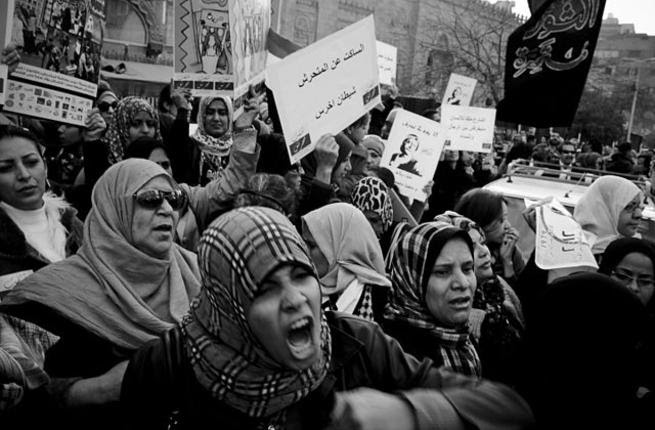Al Bawaba
Egyptian women protest harassment in Tahrir Square, 2013 (Wikimedia)
After Hollywood film executive Harvey Weinstein was accused by multiple women of rape, sexual assault and harassment over decades, it sparked an unprecedented public debate.
Capturing the mood of the moment, actor Alyssa Milano tweeted on Sunday: “If you’ve been sexually harassed or assaulted write ‘me too’ as a reply to this tweet.”
By late Monday the hashtag had been tweeted over half a million times, spreading globally.
Across the Arab world, women responded with their own hashtag, “Ana Kaman”, a colloquial translation of “me too”, as well as using the English one.
Sexual violence is a thorn in the side of all cultures and societies. In the Arab world, however, women often become victims not just of their attacker but also of legal systems founded on misogyny and of socially conservatism within their families and communities.
In this context, the concerns of women using #Ana_Kaman and #MeToo in the region took on a distinctive character.
Tweets from women in Egypt, Palestine, Kuwait and Morocco, among others, shared a common theme: no woman should be blamed for being raped or assaulted.
— lilian asaad (@lj_asaad)
Know that the blame is not on you or on your clothes or in your walk or anything, the full blame is on the dog that gave himself the right to harass you.
A student from Casablanca, @Beloua_Ouafaa, critiqued the lose-lose situation for women: fight back and you are “shameful”, do nothing then you are immoral and poorly raised.
Victim blaming is often challenged by women’s rights activists in the West. For many women in the Middle East, however, being attacked carries a far greater stigma.
Last year, for instance, U.K.-based charity Detained in Dubai warned tourists not to report rapes in the U.A.E. after a woman went to the police after being gang-raped, only to be arrested and charged with extramarital sex.
The shame attached to rape is such that in Algeria, Bahrain, Iraq, Kuwait, Libya, Palestine and Syria rapists are still allowed to walk free if they marry their victims.
The justification often given for this arrangement is that it prevents the disgrace of the survivor, and her family, and in some cases protects her from a so-called “honor killing”.
It was only this year that Morocco, Tunisia, Jordan and Lebanon ended their own similar “rape clauses”.
If that was not bad enough, under the interpretation of Islamic law applied in many Muslim-majority nations, rape within marriage is permitted.
In one Arab country in particular, women have taken #MeToo as an opportunity to speak out against daily street harassment.
An astonishing 99.3 percent of Egyptian women have been sexually harassed, according to a 2013 U.N. report.
Egyptian activist Mona Seif wrote on Facebook: “I don’t know of any female friend of mine in Egypt who have not been a victim of sexual harassment, and definitely #MeToo”
“Sexual harassment and assaults in the streets are a daily part of any woman’s life here. We think about it, prepare for -mentally and physically- everytime we step out of the door.”
Cairo was this week named the most dangerous megacity globally for women, and it scored particularly badly on sexual violence. Pervasive sexual harassment on the Egyptian capital’s streets has been well documented, most recently by project “HarassMap”.
— Nervana Mahmoud (@Nervana_1)
— Holly Dagres (@hdagres)
Sexual harassment was criminalized for the first time in Egypt for the first time in 2014, after multiple women were violently assaulted in protests. Still, Human Rights Watch (HRW) reported this year that “sexual harassment and violence against women remain endemic”.
— Maroo (@Marooyassoo)
Egypt might be particularly infamous for sexual violence, but the phenomenon is widespread elsewhere in the region.
A video showing the horrific sexual assault of a vulnerable Moroccan woman in August provoked protests. Arrests were later made in the high-profile case but it is little more than the tip of the iceberg. The majority of cases are not reported because to the stigma attached.
Rape and sexual slavery have been used on a large scale as a weapon of war in recent years, including by ISIS in Iraq and Syria, and by Bashar al-Assad’s regime.
As one BBC journalist wrote on Monday, perhaps where sexual and gender based violence in the Middle East is concerned, Hollywood’s #MeToo moment is not a strong enough statement.
— pooneh ghoddoosi (@poopoosh)







